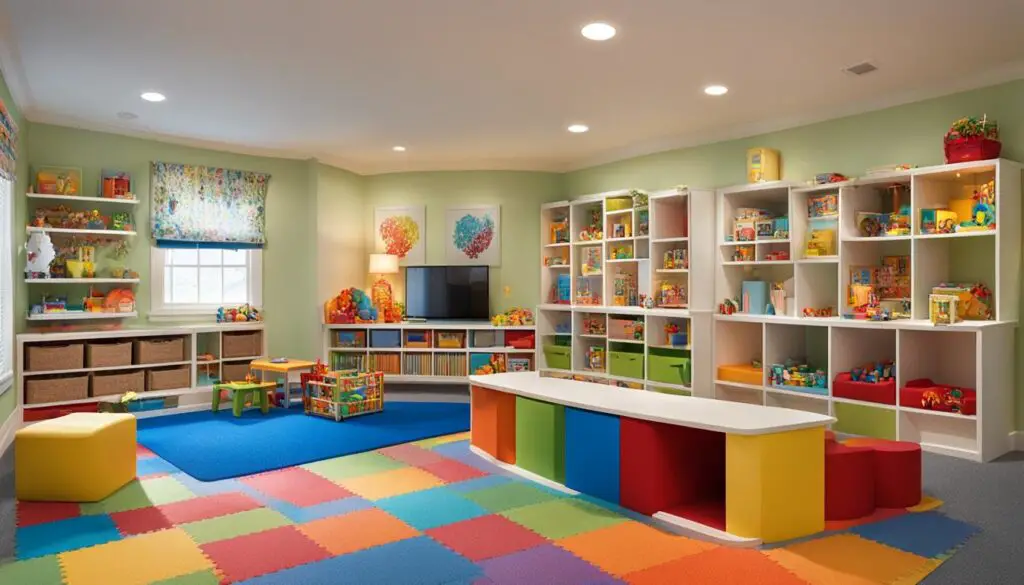
Fostering Independence in Early Childhood: Tips for Parents
As a parent, it’s natural to want to protect and care for your child. However, it’s equally essential to promote self-reliance and confidence in them from an early age. Children who are self-sufficient and independent tend to thrive and succeed in various areas of life. Fostering independence in early childhood is therefore crucial for their long-term development and growth. Here are some practical tips for parents.
Key Takeaways
- Encouraging independence in early childhood helps promote self-reliance and confidence
- Creating a safe and supportive environment is crucial for fostering independence
- Assigning age-appropriate tasks can encourage children to be more independent.
- Allowing children to make decisions and solve problems on their own can help to develop their problem-solving and decision-making skills.
- Teaching self-help skills such as dressing, feeding, and personal hygiene can foster independence in children.
Understanding the Benefits of Independence in Early Childhood
Independence is a vital component of early childhood development. It allows children to explore and learn on their own, build self-esteem, and cultivate a sense of responsibility.
One of the key benefits of fostering independence in early childhood is that it promotes problem-solving skills. When children are given the opportunity to make choices and solve problems on their own, they learn to think critically and develop essential cognitive skills that they can carry into adulthood.
Moreover, fostering independence in early childhood helps build self-esteem. When children are allowed to take on age-appropriate tasks and responsibilities, they feel empowered and capable of handling challenges. This, in turn, leads to increased self-confidence and a positive self-image.
Instilling a sense of responsibility is another advantage of independence in early childhood. By giving children tasks and responsibilities, parents can teach them the importance of fulfilling obligations and being accountable for their actions. This skill is essential for success in both personal and professional life.
Overall, there are numerous benefits to fostering independence in early childhood. By allowing children to explore, make choices, and take on responsibilities, parents can help set their children up for success and holistic development.
Creating a Safe and Supportive Environment
As parents, it is our responsibility to establish a safe and supportive environment that fosters independence in our children. By doing so, we can ensure that our children have the freedom to explore and learn on their own while feeling secure in their surroundings.
One way to create a safe environment is by childproofing our homes. This involves identifying potential hazards and taking the necessary steps to mitigate them. For instance, covering electrical outlets, securing cabinets and drawers, and installing safety gates can help prevent accidents and injuries. It is also important to ensure that toys and equipment are age-appropriate and in good condition to avoid choking hazards or other dangers.

To create a supportive environment, we need to set age-appropriate boundaries and provide guidance when needed. Boundaries help children understand what is expected of them and help them develop discipline and self-control. For example, establishing a daily routine can help children feel secure and understand what comes next. Additionally, we can offer guidance by providing feedback and support without taking over the task or decision-making process. This approach helps children develop problem-solving skills and a sense of autonomy.
Age-Appropriate Guidelines for Childproofing
| Age Group | Guidelines |
|---|---|
| 0-6 months | Remove items that could be choking hazards from the environment, such as small toys, coins, and balls |
| 6-12 months | Use safety gates to block off unsafe areas, attach furniture to walls to prevent tipping, and cover sharp corners and edges |
| 1-2 years | Install cabinet and drawer locks, secure windows and doors, and ensure that electrical outlets are covered |
| 2-3 years | Teach children about safe behaviors, such as looking both ways before crossing the street |
Overall, creating a safe and supportive environment is essential for fostering independence in our children. By taking the necessary steps to childproof our homes, setting age-appropriate boundaries, and offering guidance when needed, we can provide our children with the foundation they need to grow and thrive.
Promoting Age-Appropriate Tasks and Responsibilities
Assigning age-appropriate tasks and responsibilities is an excellent way to foster independence in children. Such activities help children understand the meaning of responsibility and instill in them a sense of ownership. These tasks and responsibilities should vary according to the child’s age group and developmental stage. The following are some examples:
| Age Group | Examples of Age-Appropriate Tasks and Responsibilities |
|---|---|
| 2-4 years old |
|
| 5-7 years old |
|
| 8-10 years old |
|
It is essential to introduce these tasks and responsibilities gradually and ensure that they are achievable. Parents should also avoid taking over entirely and instead let children learn from their mistakes and take ownership of their actions. This approach helps to build a child’s confidence and self-reliance, which are critical skills for their overall development.
Next, I will discuss strategies for encouraging decision-making and problem-solving skills in children.

Encouraging Decision-Making and Problem-Solving Skills
Children need to develop their decision-making skills and problem-solving abilities to become independent adults. As a parent, you play a crucial role in fostering these skills. Encouraging your children to make choices on their own and allowing them to face challenges, can help develop their decision-making and problem-solving abilities. Here are some tips to support your child’s development:
- Offer choices: Let your child choose between options to develop decision-making skills. Presenting different options gives children a sense of control and teaches them how to make decisions.
- Encourage problem-solving: Guide your child through difficult situations, but avoid solving them for them. Encouraging them to come up with their solutions can help them develop problem-solving skills.
- Teach consequences: Explain the consequences of decisions, both good and bad. Children need to learn that each decision they make leads to a certain result, fostering critical thinking.
- Celebrate achievements: Celebrate when children make choices that lead to a successful outcome. Acknowledging their hard work reinforces their abilities and encourages them to try again.
Encouraging decision-making and problem-solving skills can help children become confident decision-makers, leading to increased independence in daily life.
Nurturing Self-Help Skills
Teaching self-help skills is essential in fostering independence and promoting early childhood development. By encouraging self-care practices, such as dressing, feeding, and personal hygiene, parents can support their children’s independence.
Here are some practical tips to help parents facilitate the development of self-help skills:
- Use visual aids: To teach kids how to dress, use pictures or videos to demonstrate the sequence of steps involved. You can also label dresser drawers or use color-coded hangers to make it easier for children to pick out their clothes.
- Encourage practice: Give your child plenty of opportunities to practice self-help skills, such as tying shoelaces or brushing teeth. Celebrate their efforts and progress to boost confidence.
- Set achievable goals: Set targets that are realistic and achievable based on your child’s age and abilities. For example, young toddlers can learn to put on their own socks while older ones can start to brush their own hair.
- Provide guidance: Offer guidance and support when needed, but avoid taking over completely. Encourage them to ask for help when necessary, but try to foster a sense of independence.
Remember, the goal is to encourage self-reliance and confidence in children, so be patient and supportive throughout the learning process.
“When we teach children to love and care for themselves, we are teaching them to love and care for the world.” – Louise L. Hay
Encouraging Self-Expression and Individuality
In fostering independence, it’s important to promote self-expression and celebrate individuality in children. Encouraging creativity and allowing children to explore their interests can help build self-confidence and a strong sense of identity.
One strategy is to offer a variety of materials and activities that allow children to express themselves freely, such as drawing, painting, dancing, or singing. Providing positive feedback and actively engaging with their creations can show children that their perspectives and ideas are valuable and respected.
Another way to promote self-expression is by demonstrating active listening and showing interest in what your child has to say. When children feel that their ideas are heard and valued, they are more likely to continue sharing their thoughts and feelings.
It’s important to remember that every child is unique and has their own way of expressing themselves. It’s essential to respect and support their individuality, even if it may differ from our own preferences or expectations.
“Individuality is the spark that ignites creativity and fuels the fire of self-expression.”
Conclusion
In conclusion, fostering independence in early childhood is crucial for the holistic development of children. As a parent, I understand the importance of promoting self-reliance and confidence in my child. By creating a safe and supportive environment, offering age-appropriate tasks and responsibilities, encouraging decision-making and problem-solving skills, nurturing self-help skills, and embracing self-expression, I can help my child thrive with independence. It is essential to remember that every child is unique, and the rate of development may vary. Therefore, parents must offer support and guidance while allowing their child to explore and learn independently.
FAQ
Why is fostering independence important in early childhood?
Fostering independence in early childhood is essential for the development of self-reliance and confidence in children. It allows them to explore their abilities, develop problem-solving skills, and build a sense of responsibility.
What are the benefits of promoting independence in early childhood?
Promoting independence in early childhood has numerous benefits. It helps children develop problem-solving skills, boosts their self-esteem, instills a sense of responsibility, encourages creativity, and prepares them for future challenges.
How can I create a safe and supportive environment for my child?
To create a safe and supportive environment for your child, it is important to childproof your home, set age-appropriate boundaries, offer guidance when needed, and provide a nurturing and encouraging atmosphere where they feel secure to explore and learn independently.
What are some age-appropriate tasks and responsibilities I can assign to my child?
Assigning age-appropriate tasks and responsibilities is a great way to encourage independence. For example, young children can help with simple chores like tidying up their toys, while older children can take on more responsibility by feeding pets or completing homework without constant supervision.
How can I encourage my child’s decision-making and problem-solving skills?
Encouraging decision-making and problem-solving skills involves allowing your child to face challenges, supporting their choices, and providing guidance when necessary. Giving them opportunities to make decisions, such as choosing their own clothes or planning a family activity, can help foster these skills.
What are some self-help skills I can teach my child?
Teaching self-help skills is crucial for independence. For example, you can teach your child how to dress themselves, feed themselves, brush their teeth, and use the toilet. Start with age-appropriate tasks and gradually introduce more complex skills as they grow older.
How can I encourage my child’s self-expression and individuality?
To encourage self-expression and individuality, provide opportunities for your child to express themselves creatively through art, music, or other activities they enjoy. Support their interests, encourage open communication, and allow them to make choices that reflect their unique personality.